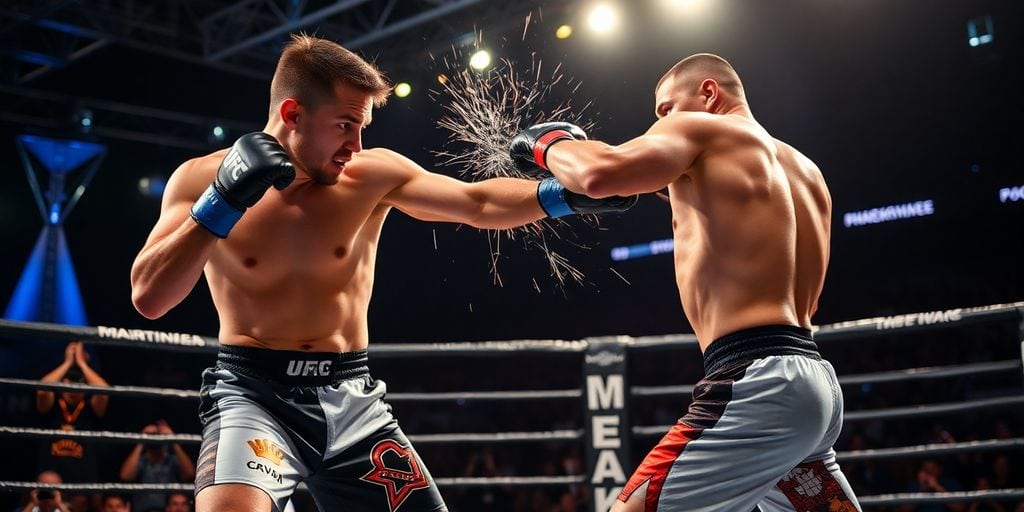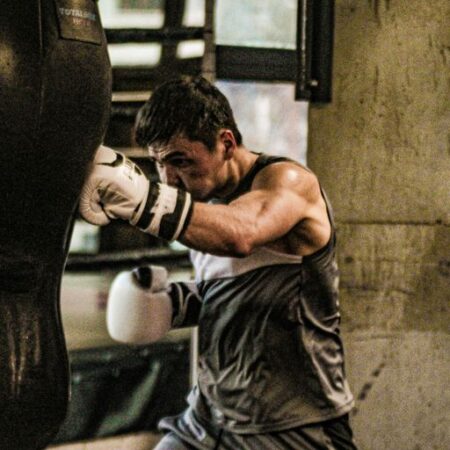Becoming a UFC fighter is a dream for many martial artists, but it’s not as simple as just stepping into the octagon. It requires years of hard work, dedication, and the right strategy. In this guide, we’ll break down the essential steps on how to get into the UFC, from training in martial arts to catching the eye of scouts. If you’re serious about making it to the big leagues, keep reading to learn how to turn your dream into reality.
Key Takeaways
- Start with a solid foundation in martial arts by choosing the right discipline and training regularly.
- Gain experience by competing in amateur fights and building a strong record to attract attention.
- Find a good MMA gym with experienced coaches who can help refine your skills.
- Develop a unique fighting style by blending different techniques and focusing on your strengths.
- Network within the fighting community and create a strong online presence to get noticed by UFC scouts.
Building A Strong Foundation In Martial Arts
So, you want to be a UFC fighter? Awesome! But before you even think about stepping into the Octagon, you gotta build a solid base. It’s like constructing a house – if the foundation is weak, the whole thing will crumble. This means dedicating time and effort to mastering the fundamentals of martial arts. It’s not just about knowing a few cool moves; it’s about understanding the principles behind them and being able to apply them effectively.
Choosing The Right Martial Art
Okay, so where do you even start? There are a ton of different martial arts out there, and it can be overwhelming. The best approach is to pick one or two that complement each other and cover different aspects of fighting. For example, Wrestling and Judo are great for grappling and control, while boxing or Muay Thai can help you develop striking power. Don’t spread yourself too thin by trying to learn everything at once. Focus on building a strong base in a few key areas, and then expand your skillset as you progress.
Here’s a quick rundown of popular choices:
- Boxing: Excellent for developing punching technique, footwork, and head movement.
- Brazilian Jiu-Jitsu (BJJ): Focuses on ground fighting, submissions, and control. A must-have for any MMA fighter.
- Muay Thai: Known as the “art of eight limbs,” it incorporates punches, kicks, knees, and elbows.
- Wrestling: Teaches takedowns, control, and how to avoid being taken down. Super important for dictating where the fight takes place.
Training Consistently
This might sound obvious, but consistency is key. You can’t expect to become a skilled fighter by training sporadically. Set a realistic schedule and stick to it. Aim for at least a few sessions per week, and gradually increase the intensity and duration as you get fitter. It’s better to train consistently at a moderate level than to burn yourself out with intense training sessions every now and then. Think of it as a marathon, not a sprint. Also, don’t forget to listen to your body and take rest days when needed. Overtraining can lead to injuries and setbacks.
Understanding Fight Styles
It’s not enough to just learn techniques; you also need to understand how different fighting styles work. This means studying the strengths and weaknesses of various martial arts, and how they interact with each other. For example, a striker might try to keep the fight standing, while a grappler will try to take it to the ground. Understanding these dynamics will help you develop a well-rounded game and adapt to different opponents. Watch fights, analyze techniques, and talk to experienced fighters and coaches. The more you understand about the art of fighting, the better prepared you’ll be.
It’s important to remember that building a strong foundation takes time and dedication. There are no shortcuts to success in martial arts. Be patient, persistent, and always be willing to learn. With hard work and the right guidance, you can achieve your goals and make your dream of fighting in the UFC a reality.
Gaining Experience Through Amateur Fights

Okay, so you’ve been training hard, you feel like you’re getting somewhere. What’s next? It’s time to test yourself in the proving ground of amateur fights. This is where you transition from the controlled environment of the gym to the unpredictable chaos of real competition. It’s a big step, but a necessary one if you’re serious about making it to the UFC.
Participating In Local Competitions
First things first, you need to find some local MMA events. These are usually smaller shows, often held in community centers or smaller venues. Don’t expect the glitz and glam of the UFC; these are grassroots events where fighters are just starting out. The goal here isn’t to make money (you probably won’t), but to gain experience and exposure. Look for promotions that are well-organized and have a good reputation. You can usually find these by talking to your coaches or other fighters at your gym. The MMA group is a great place to start.
Building A Winning Record
While experience is the primary goal early on, let’s be real: winning matters. A string of losses isn’t going to impress anyone. That doesn’t mean you should only take easy fights, but you should be strategic about who you fight and when. Focus on improving with each fight, learning from your mistakes, and developing a winning mentality.
Here’s a simple table to track your progress:
| Fight # | Opponent | Result | Notes |
|---|---|---|---|
| 1 | John Doe | Win (Decision) | Good striking, needs work on ground game |
| 2 | Jane Smith | Loss (Submission) | Dominated on the ground, improve wrestling defense |
| 3 | Mike Brown | Win (TKO) | Improved ground game, good striking defense |
Networking With Other Fighters
Amateur fights aren’t just about what happens in the cage; they’re also about what happens outside of it. These events are a great place to meet other fighters, coaches, and promoters. Building relationships with these people can open doors down the road. Don’t be afraid to introduce yourself, ask questions, and exchange contact information. You never know who might be able to help you on your journey.
Remember, every fight, win or lose, is a learning opportunity. Analyze your performance, identify areas for improvement, and use that knowledge to become a better fighter. Don’t get discouraged by setbacks; they’re a part of the process. Stay focused on your goals, keep training hard, and never give up on your dream of making it to the UFC.
Finding The Right Training Environment
Okay, so you’re serious about this UFC thing. You’ve got some skills, you’re putting in the work, but where you train matters a lot. It’s not just about having a heavy bag and some mats. It’s about the people, the atmosphere, and the overall approach to training. Finding the right gym can be a game-changer, and honestly, it can make or break your progress. Let’s get into it.
Joining A Reputable MMA Gym
Finding a good MMA gym is like finding the right college – it needs to be a good fit. Don’t just pick the closest one or the one with the coolest logo. Do your homework. Look for gyms with a solid track record, coaches who have experience training successful fighters, and a positive, supportive environment. A good gym will push you, but it won’t break you. Check out some MMA training camps to get an idea of what’s out there.
Here’s a few things to consider:
- Coaches’ Credentials: What’s their background? Have they trained fighters who have achieved a high level of success?
- Training Partners: Are there other serious fighters at the gym who will push you and help you improve?
- Gym Culture: Is it a positive and supportive environment, or is it full of egos and negativity?
Working With Experienced Coaches
Coaches are more than just instructors; they’re mentors, strategists, and corner-men all rolled into one. A good coach can identify your strengths and weaknesses, develop a training plan tailored to your needs, and provide guidance and support both inside and outside the gym. Look for coaches who have a proven track record of success and who are committed to helping you reach your full potential. It’s important to find someone whose coaching philosophy aligns with your goals and values. Some coaches might focus on hard training all the time, while others prioritize the athlete’s well-being. Choose what works for you.
Utilizing Sparring Sessions
Sparring is where you put your skills to the test and learn how to apply them in a live situation. But it’s not just about beating each other up. Sparring should be a learning experience, a chance to experiment with new techniques, and to develop your timing, reflexes, and fight IQ. Make sure the gym has a structured sparring program with clear rules and guidelines, and that the coaches are actively involved in providing feedback and guidance. Light sparring is important, it’s like an actual fight, but not too hard, so you can apply techniques without going all out. It’s about improving, not winning every round.
The right training environment can make all the difference in your journey to the UFC. It’s about finding a place where you feel challenged, supported, and inspired to be your best. Don’t settle for anything less.
Developing A Unique Fighting Style

It’s not enough to just be good; you need to be memorable. Think about it: tons of people train, but only a few become legends. What sets them apart? Often, it’s their unique approach to fighting. It’s about finding what works for you and making it your own. It’s about developing a distinctive fighting style that people will remember.
Incorporating Various Techniques
Don’t limit yourself. Explore different martial arts and fighting styles. Take bits and pieces from each that resonate with you and your natural abilities. Maybe you’re a wrestler at heart but find that you have a knack for Muay Thai kicks. Or perhaps you’re a boxer who discovers a talent for submissions. The key is to experiment and see what you can blend together to create something new and effective.
Focusing On Strengths And Weaknesses
Be honest with yourself. What are you good at? What needs work? Double down on your strengths. If you have knockout power, hone it. If you’re a grappling wizard, become even better. But don’t ignore your weaknesses. Work on your takedown defense if you’re a striker, and improve your striking if you’re a grappler. A well-rounded game is essential, but your strengths are what will make you stand out.
Adapting To Different Opponents
No two fights are the same. Each opponent will bring a different set of skills and challenges. You need to be able to adjust your game plan on the fly. This means being versatile and adaptable. Study your opponents, identify their weaknesses, and exploit them. If they’re a strong striker, take them down. If they’re a skilled grappler, keep the fight standing. Being able to adapt is what separates the good fighters from the great ones.
Developing a unique fighting style isn’t just about techniques; it’s about understanding yourself as a fighter. It’s about knowing your strengths, acknowledging your weaknesses, and constantly evolving. It’s a journey of self-discovery that will ultimately define you in the ring.
Getting Noticed By UFC Scouts
Okay, so you’ve put in the work. You’re training hard, winning fights, and honing your skills. Now it’s time to get on the UFC’s radar. This isn’t just about being good; it’s about being seen. Here’s how to make some noise and get those scouts to notice you.
Creating An Impressive Fight Resume
Your fight resume is your MMA highlight reel. It’s what scouts will look at to quickly assess your potential. A string of wins is great, but the quality of those wins matters too. Were they against tough opponents? Did you finish fights decisively? A resume filled with first-round knockouts is way more impressive than a bunch of decision victories. Make sure your record is easily accessible online, and keep it updated after every fight. Consider including video highlights of your best performances.
Leveraging Social Media Presence
In today’s world, social media is a powerful tool. It’s not enough to just be a great fighter; you need to build a brand. Post regularly, share training footage, and engage with fans. Use platforms like Instagram, Twitter, and YouTube to showcase your personality and skills. A strong social media presence can attract sponsors, increase your visibility, and ultimately, get you noticed by UFC scouts. Think of it as free advertising for your fighting career. You can also use it to build a support network.
Attending UFC Events
Going to UFC events is more than just being a fan; it’s an opportunity to network and immerse yourself in the world of professional MMA. Get a feel for the atmosphere, watch the fighters up close, and try to make connections with people in the industry. You never know who you might meet – a scout, a manager, or even another fighter who can help you get your foot in the door. Plus, being there in person shows your dedication and passion for the sport.
Think of attending UFC events as doing your homework. You’re studying the competition, learning the ropes, and making valuable connections that could pay off big time down the road.
Preparing For UFC Tryouts
So, you’ve been grinding, putting in the hours, and dreaming of stepping into the Octagon. Now it’s time to focus on UFC tryouts. It’s a big step, and preparation is key. Let’s break down what you need to know.
Understanding The Tryout Process
UFC tryouts aren’t just about showing up and fighting. They’re about demonstrating your overall package: skills, athleticism, and personality. The tryout process typically involves a series of drills, sparring sessions, and interviews. You’ll be assessed on your striking, grappling, wrestling, and overall fight IQ. They also want to see how you handle pressure and interact with others. It’s not just about being a good fighter; it’s about being marketable and representing the UFC brand well. Make sure you research the specific format of the tryout you’re attending, as it can vary.
Showcasing Your Skills
This is your moment to shine. Don’t hold back, but don’t be reckless either. Focus on highlighting your strengths and demonstrating your unique fighting style. Be prepared to adapt to different opponents and situations. Show your versatility and willingness to learn. Remember, the scouts are looking for fighters who can bring something new and exciting to the ROAD TO UFC. It’s not just about winning; it’s about making an impression. Here are some things to keep in mind:
- Be Confident: Project confidence in your abilities, even if you’re nervous.
- Be Coachable: Show that you’re willing to listen to and implement feedback.
- Be Respectful: Treat your opponents and the coaches with respect, even during intense sparring sessions.
Building A Support Network
Going through UFC tryouts can be a stressful experience. It’s important to have a strong support network to lean on. This includes your coaches, training partners, family, and friends. They can provide encouragement, motivation, and valuable feedback. Don’t be afraid to ask for help when you need it. Having people in your corner can make all the difference in your performance and mental state. Consider these points:
- Coaches: They can provide guidance and help you prepare for the tryouts.
- Training Partners: They can push you to your limits and help you improve your skills.
- Family and Friends: They can offer emotional support and help you stay grounded.
Remember, getting into the UFC is a marathon, not a sprint. It takes time, dedication, and a lot of hard work. Don’t get discouraged if you don’t make it on your first try. Keep training, keep improving, and keep believing in yourself. Your dream is within reach.
Maintaining Physical And Mental Fitness
This part is super important. You can’t just be physically strong; you also need to be mentally tough to make it in the UFC. It’s a grind, and taking care of yourself, inside and out, is key.
Implementing A Balanced Diet
Okay, so food. It’s not just about cutting weight; it’s about fueling your body for peak performance. Think of your body as a high-performance car – you wouldn’t put cheap gas in it, right? Same deal here. You need the right nutrients to recover, build muscle, and have the energy to train hard. I’m not a nutritionist, but I know the basics: lean protein, complex carbs, healthy fats, and lots of fruits and veggies. Ditch the junk food and sugary drinks. It’s a lifestyle change, not a temporary diet. A balanced diet is key for UFC fighters.
Incorporating Strength And Conditioning
Strength and conditioning are non-negotiable. You need to be strong, explosive, and have the stamina to go the distance. It’s not just about lifting heavy weights; it’s about functional strength that translates to the cage. Think compound exercises like squats, deadlifts, bench press, and overhead press. Add in some plyometrics for explosiveness and cardio for endurance. Find a good strength and conditioning coach who understands the demands of MMA. They can help you develop a program that’s tailored to your specific needs and goals.
Developing Mental Toughness
This is where a lot of fighters fall short. The mental game is just as important as the physical game. You need to be able to handle pressure, stay focused, and bounce back from adversity. It’s about building resilience and developing a winning mindset. Here are some things that can help:
- Visualization: Imagine yourself succeeding in the cage. See yourself executing your techniques perfectly and overcoming challenges.
- Meditation: Take some time each day to quiet your mind and focus on your breath. This can help you reduce stress and improve focus.
- Positive Self-Talk: Replace negative thoughts with positive affirmations. Believe in yourself and your abilities.
Mental toughness is like a muscle; you have to train it to make it stronger. It’s not something you’re born with; it’s something you develop over time through hard work and dedication.
It’s a tough sport, but with the right mindset, you can overcome anything.
Wrapping It Up
So, there you have it. Getting into the UFC isn’t a walk in the park. It takes a lot of hard work, dedication, and a bit of luck. You’ve got to train hard, fight often, and make sure people notice you. Don’t forget to network and keep your social media game strong.
It might take years, but if you stick with it and keep improving, you could find yourself in the octagon one day. Just remember, every fighter’s journey is different, so stay focused on your own path. Finally, if you are looking to have some fun using your expertise for some casual bets, check out our recommended list of the best sports betting apps to give a shot.
Frequently Asked Questions
How long does it take to become a UFC fighter?
It usually takes about 5 to 8 years to become a UFC fighter, especially if you are starting from scratch.
What martial arts should I learn to get into the UFC?
You should focus on a mix of striking arts like boxing and kickboxing, and grappling arts like wrestling or Brazilian jiu-jitsu.
Do I need to win amateur fights to get noticed by the UFC?
Yes, having a good record in amateur fights can help you get noticed by UFC scouts.
How important is social media for becoming a UFC fighter?
Having a strong social media presence can help you connect with fans and attract the attention of UFC scouts.
What should I do to prepare for UFC tryouts?
You should train hard, showcase your skills in fights, and have a solid support network to help you through the process.
Is it necessary to have a coach to become a UFC fighter?
Yes, working with an experienced coach is very important as they can guide your training and help you improve your skills.











